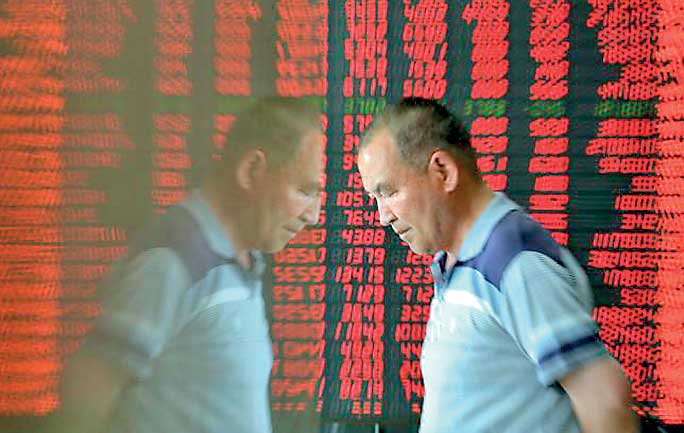Thursday Feb 19, 2026
Thursday Feb 19, 2026
Wednesday, 10 June 2015 00:00 - - {{hitsCtrl.values.hits}}

An investor is reflected on the surface of a wall as he walks past an electronic board showing stock information, filled with red figures indicating rising prices, at a brokerage house in Taiyuan, Shanxi province, China-REUTERS
London (Reuters): European shares followed Asian stocks lower on Tuesday as speculation intensified that the US Federal Reserve could raise interest rates sooner than many expect, though this failed to give the dollar a significant boost.
Concern the Fed could hike rates for the first time since 2006 as soon as September – triggered by forecast-beating jobs data last Friday – pushed US stocks lower on Monday before spreading across the globe.
The pan-European FTSEurofirst 300 index fell for the sixth consecutive day to hit a one-month low. It was last down 0.3% in early deals. HSBC gained 0.2%, however, after announcing a plan to cut up to 50,000 jobs and take an axe to its investment bank.
“We’re agnostic as to whether the rate rise will be September or November ... the balance of probabilities suggests it might be September,” Coutts global equity strategist James Butterfill said.
Earlier, Tokyo’s Nikkei index suffered its biggest fall in nearly a month, down 1.8% on US rate worries and uncertainty over whether Greece can clinch a deal with its creditors to avoid default.
MSCI’s main index of Asia-Pacific shares outside Japan shed 0.9% to a fresh 10-week low.
Chinese shares eased after soft inflation data suggested the economy was still struggling, even though Beijing is expected to add more policy stimulus.
The CSI300 index of the largest listed companies in Shanghai and Shenzhen fell 0.7%.
MSCI will soon announce whether to include China ‘A’ shares in its Emerging Markets Index, a decision the index publisher says would draw $400 billion to China stocks over time. The fall on Wall Street saw the Dow Jones Industrial average fall 0.5% and slip into a loss for 2015.
Oil prices edged up on Tuesday on hopes of more economic stimulus in China after disappointing data from the world’s No.2 economy.
China’s consumer inflation weakened more than expected, to 1.2% year-on-year in May, raising concerns about growing deflationary pressures as the economy cools. Its producer prices fell for the 38th straight month.
“The weak data continues to point out the sluggish demand in the real economy. The government should roll out more easing measures to lower the real financing costs to boost growth,” said Yu Yafang, macro strategist at Huachuang Securities in Beijing.
Front month US crude climbed 41 cents to $58.55 a barrel by 0655 GMT, after ending the previous session down 99 cents. Brent for July delivery rose 45 cents to $63.14 a barrel, having settled down 62 cents in the previous session.
Chinese oil imports fell about 11% in May from a year ago in the steepest drop since November 2013.
“The weak import numbers were a result of a significant increase in refinery maintenance in May ... At the same time, the strong level of imports in recent months has put pressure on storage facilities at ports in China,” Australia and New Zealand Banking Group Ltd (ANZ) said in a research note on Tuesday.